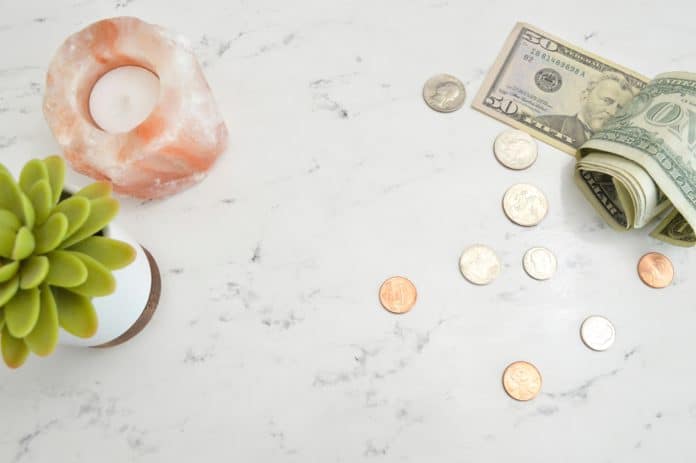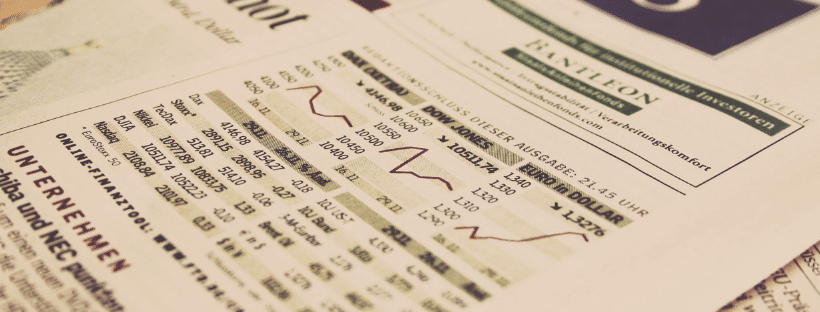
I’ve always been fascinated with money. It’s true … I’d love to be filthy, stinking rich! Not because of all the stuff I could buy (even though that sounds very appealing) but because having ‘enough’ brings with it a certain kind of calm. A piece and quiet of not having to worry about money. And sure, part of having enough is being happy with what you have, but there’s always part of me that wants more, that worries about not having enough.
So I’ve always been very conscious about earning and spending my money. On the one hand I try to be mindful of what I spend it on (does it really bring me value?) and on the other hand, I’m always looking for ways to earn more.
How to increase my income?
There’s two ways to do that: you can ‘actively’ work to make a living and you can ‘passively’ make your money work for you. That’s why in 2014 I started looking into the stock market and other ways to ‘earn money by using my money’. So I’ve written down the 4 things I do/invest in that are slowly increasing my income.
Since these are tricky topics, there are a few rules I try to stick to:
- Balance and diversification are key. Some things I do are risky and others are less risky. Some things have been around for years while others are fairly new and unknown. Having this balance keeps me from only doing risky things (where the reward might be higher) and prevents me from being to safe (where I might not get the most out of my efforts). I’m a Libra so balance is in my nature ;-) but it’s also the first thing any financial advisor will recommend.
- I don’t invest money I’m not willing to lose. This means I think really hard before investing and I always keep a ‘normal’ savings account for when I might need it.
- I’ve already accepted that I might lose money. This is similar to the previous rule, but it’s different in the fact that this is more about mindset. E.g. when the crypto market crashed in December 2018, I didn’t freak out or panic because I had already accepted that I might lose the money. This is important because when it comes to finances, emotions usually lead to bad decisions.
- I’m in it for the long term. I don’t trade on a daily basis and everything I purchase is a ‘passive’ investment. I’m letting my money work for me instead of the other way around. I buy and I hold for the future.
I own my house
Actually the bank owns most of it, but you know what I mean … This is probably the ‘safest’ thing I’ve done so far :-) I bought my own house about 6 years ago when I just turned 25. Since the house is not that big, my mortgage payments are only slightly higher than the price I was paying to rent an apartment. So it made perfect sense to make the switch.
The rent was going to some random landlord whom I’d never met, while the payments I make now are going towards my future. Sure, I pay some interest to the bank, but still … in about 20 years I’ll own my house completely for only slightly more money than I would’ve otherwise given away to a landlord.
I invest in the stock market
Whenever I talk about this, I get one of 2 looks: either my friends have a confused look (I don’t understand how all of that works.) or they have this crazy look (You’re going to lose all of your money!).
And while it’s true that in theory I could lose all my money, the reality is that there are ways to minimise your risk if you understand how index funds work.
What does that mean? Well, I’ve never invested in shares of a particular company like Amazon, Google or Apple. I don’t know enough about these companies, how they operate and what their future will bring to know how I should invest. But what I do invest in are index funds. These are ‘collections’ of multiple companies gathered in one share. So basically I’m buying a little bit of a lot of companies (remember my diversification rule?).
One of the most famous indexes is the S&P 500 which gathers the 500 biggest companies in the US. So even though there’s always a chance that the US economy will suddenly fail, the chances of that happening are very slim. And even though owning a piece of the top 500 US companies is pretty diversified, you can go even further by purchasing additional funds that gather companies of a different country, a certain sector, etc.
There’s sooooo much more to get into when it comes to investing in the stock market. If you want to learn more, please have a look at Mr Money Mustache’s blog post on investing. He explains all of this in a much better way than I can :-)
I bought cryptocurrencies
Hah, again, when I tell people I’ve bought cryptocurrencies the only thing I see in their eyes is that they think I’m crazy :-)
It’s true that cryptocurrencies are a lot more volatile and riskier and unknown than the stock market is, but the basics are the same: you buy a certain coin and hope it goes up.
Even if you don’t own any cryptocurrencies you’ve probably heard there was a big crash and a lot of people lost money. As did I unfortunately. But my rule nr 4 kept me from selling everything at a loss. I have the patience to wait until the market recovers because I’m in it for the long run.
Of course, I’m not just resting and doing nothing with the crypto I have now. While I’m waiting for things to go back up I lend out my coins to other people that do want to ‘actively’ trade them and so I’m making a nice profit on those loans. I use the platform Coinlend which automates the process of lending out my crypto to other people and have been getting a nice 2% interest rate on average.
I do P2P lending
Another ‘peculiar thing I do with my money’ is lending it out to other people. Sort of like the crypto lending above, but with normal currencies.
Why? A lot of people are unable to get loans from banks so they turn to the internet to get a personal loan (often at much higher interest rates). There are a few different platform that arrange these peer-to-peer loans where a person with money can lend money to someone who needs it.
The platform I use is called Bondora and is used only in Europe. I’ve written a post before on how I use Bondora, so feel free to have a look there for more in depth info.
—-
That was a short summary of 4 things I invest my money in to make it work for me. Do let me know if you want me to go into more detail one of of them. I might do a separate blog post then.
In the mean time, if you want to learn more about how to handle your own finances and maybe work towards financial freedom, I recommend 2 of Tony Robbins’ books: Money: Master the game & Unshakeable: Your financial freedom playbook. I read both of them and he gives great practical advice on the topic and really encourages a mindset shift which I think is much needed.































